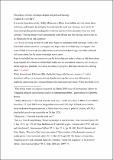The politics of hope : privilege, despair and political theology
Abstract
Situated within feminist Christian Realism, this article looks at what political theology is and its relevance to International Relations. Hope is a central theme to political theology, underpinning the necessity to be witness to and to work against oppressive structures. Simply put, hope is the desire to make life better. For Christians, this hope stems from a belief in resurrection of Christ and the faith that such redemption is offered to all of humanity. Hope, however, is not limited to Christianity and, therefore, Christian theology. Thus, taking an intersectional approach, the article looks for similarities in how hope is articulated in three personal narratives: theologian Jürgen Moltmann, UK Muslim advocate Asim Qureshi, and Black Lives Matter co-founder Patrisse Khan-Cullors. Across all three personal narratives, the need for hope begins in a place of despair, signalling a need to recognize that hope and privilege are in tension with one another. Feminist Christian Realism acknowledges and embraces this tension, recognizing that hope cannot function if the pain, oppression and harm caused by privilege are erased or minimized.
Citation
Gentry , C E 2020 , ' The politics of hope : privilege, despair and political theology ' , International Affairs , vol. 96 , no. 2 , pp. 365-382 . https://doi.org/10.1093/ia/iiaa011
Publication
International Affairs
Status
Peer reviewed
ISSN
0020-5850Type
Journal article
Collections
Items in the St Andrews Research Repository are protected by copyright, with all rights reserved, unless otherwise indicated.

